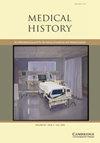The South American medical communities in the genesis of the tropical medicine: construction and circulation of knowledge on American leishmaniasis in the beginning of the twentieth century
IF 0.9
2区 哲学
Q4 HEALTH CARE SCIENCES & SERVICES
引用次数: 0
Abstract
Abstract This article aims to demonstrate how researchers from different South American countries took part in the process of globalisation of the tropical medicine paradigm, through research on leishmaniasis found in this region. The main objective of the present article is to highlight the role of these researchers, as well as of their scientific institutions, in a global history of tropical medicine which surpassed European borders and its imperialistic practices. At the same time, it will be identified the renewal of the tropical medicine paradigm in the South American context. During the beginning of the twentieth century, leishmaniasis became an important health issue in tropical areas, whereas the mere usage of the repertoire of the medical knowledge, produced in Europe up until that time, revealed itself as an insufficient instrument to help solve the problem. Hereupon, this matter was, above all, an open discussion, which required great skills and refined techniques of tropical medicine for its study. For this reason, it enabled the members of the regional medical communities to establish vigorous communication channels with medical centres, located in other continents, that had already been giving much deserved importance to leishmaniasis as an exciting scientific theme.热带医学起源中的南美医学界:二十世纪初美国利什曼病知识的构建和传播
本文旨在通过对南美地区发现的利什曼病的研究,展示来自不同南美国家的科学家如何参与热带医学范式的全球化进程。本文的主要目的是强调这些研究人员以及他们的科学机构在超越欧洲边界及其帝国主义实践的全球热带医学史中的作用。与此同时,将确定在南美洲范围内更新热带医学范例的问题。20世纪初,利什曼病成为热带地区一个重要的健康问题,而仅仅利用欧洲在此之前产生的医学知识,不足以帮助解决这一问题。因此,这个问题首先是一个公开的讨论,这需要高超的技巧和热带医学的精湛技术来研究。因此,它使区域医疗界的成员能够与其他大陆的医疗中心建立积极的沟通渠道,这些医疗中心已经将利什曼病作为一个令人兴奋的科学主题给予了应有的重视。
本文章由计算机程序翻译,如有差异,请以英文原文为准。
求助全文
约1分钟内获得全文
求助全文
来源期刊

Medical History
医学-科学史与科学哲学
CiteScore
1.60
自引率
0.00%
发文量
25
审稿时长
>12 weeks
期刊介绍:
Medical History is a refereed journal devoted to all aspects of the history of medicine and health, with the goal of broadening and deepening the understanding of the field, in the widest sense, by historical studies of the highest quality. It is also the journal of the European Association for the History of Medicine and Health. The membership of the Editorial Board, which includes senior members of the EAHMH, reflects the commitment to the finest international standards in refereeing of submitted papers and the reviewing of books. The journal publishes in English, but welcomes submissions from scholars for whom English is not a first language; language and copy-editing assistance will be provided wherever possible.
 求助内容:
求助内容: 应助结果提醒方式:
应助结果提醒方式:


